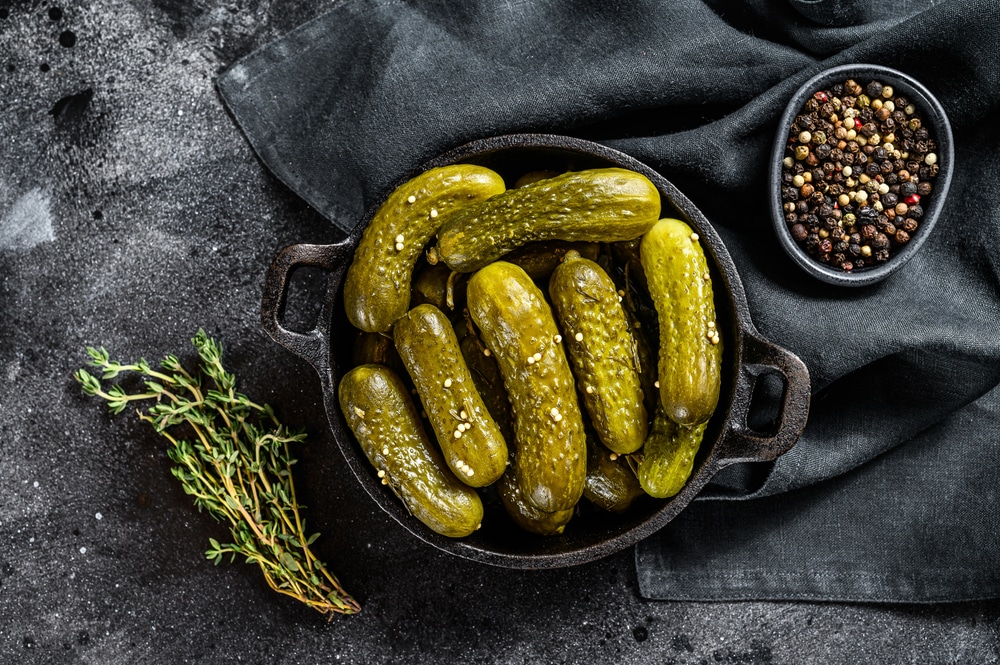
If you like savory foods, we are sure that you have a jar of pickles lying around in the kitchen pantry. While many people like to consume these pickles on their own, they also taste amazing with sandwiches. However, refrigerated vs. non-refrigerated pickles are a big concern and we have the details available for you!
Refrigerated vs Non-Refrigerated Pickles
For the most part, everyone thinks that pickles need to be refrigerated but it is not always the case. This is because, in the majority of cases, pickles are refrigerated for preservation purposes. This is because there are non-refrigerated pickles are there that don’t need to be put in the refrigerator. In addition, refrigeration depends on which pickle you have and what techniques are used.
Refrigerated Pickles
The refrigerated pickles are simply the pickles that you pick up from the refrigeration section of the grocery store and need to be kept in the refrigerator while using it. To add more to it, refrigerated pickles are a form of preservation that involves putting cucumbers in the brine and storing them at a lower temperature. This process takes over six months, making it a promising choice for people who want to keep something fresh during the winter season when it’s hard to find fresh produce.
These are the quick-processed pickles as they are processed to ensure there is no spoiling. These pickles are highly likely to remain safe to eat for over three months in the refrigerator, which means they have a longer shelf life. In addition, the fresh product pickles are also refrigerated pickled that have to be stored in a refrigerator to ensure it doesn’t spoil or become unsafe to eat. As far as the price is concerned, refrigerated pickles tend to be more expensive.
Non-Refrigerated Pickles
To begin with, non-refrigerated pickles are the ones that you pick up from the regular shelves which don’t need any refrigeration. Fermented pickles are actually one of the common forms of non-refrigerated pickles which can be put into the refrigerator for around two weeks but it doesn’t really require refrigeration. The non-refrigerated pickles have to be kept at room temperature and need to be covered with a clean paper towel and cloth to ensure the dirt and dust stay away.
These pickles can be soaked in brine or saltwater solution which makes it a tangy and delicious snack. The non-refrigerated pickles can be served as a side dish or appetizers. Since they don’t need refrigeration, they can be kept on the countertop, cabinets, and pantry shelf. Secondly, sweet pickles are included in the non-refrigerated pickles because they don’t have any vinegar. Also, they are more affordable since there are no complicated ingredients involved.
Storing The Pickles
The commercially-produced pickles can be easily found on the grocery store shelves but some of them have to be refrigerated. It wouldn’t be wrong to say that they taste better when refrigerated and add a crispy snap when you bite on them. For the most part, the pickles have to be refrigerated because they are not pasteurized (the process that destroys microorganisms and pathogens).
The unpasteurized pickled are untreated with salt, water brine, and vinegar to kill pathogens and microorganisms during fermentation. For this reason, the pickles need to be refrigerated to limit the fermentation process. If the pickle is left at room temperature, the fermentation will continue and the pickles will have lumps and change in flavor. Some additional tips for storing the pickles include;
- You must not metal containers to store pickles because they are acidic and a chemical reaction will release harmful toxins
- Glass is the ideal choice for storing pickles since there is no chemical reaction associated with this material
- Don’t expose the pickle jars to light because it can degrade the pickle contents, so make sure you store it in a dark place
- Always reseal the pickle jar tightly to achieve maximum freshness
The Bottom Line
Pickles have become the ultimate food staples in our household but refrigeration depends on the type of pickle that you are using. This is because some pickles can be kept on the countertop or at room temperature while some should be placed in the refrigerator.